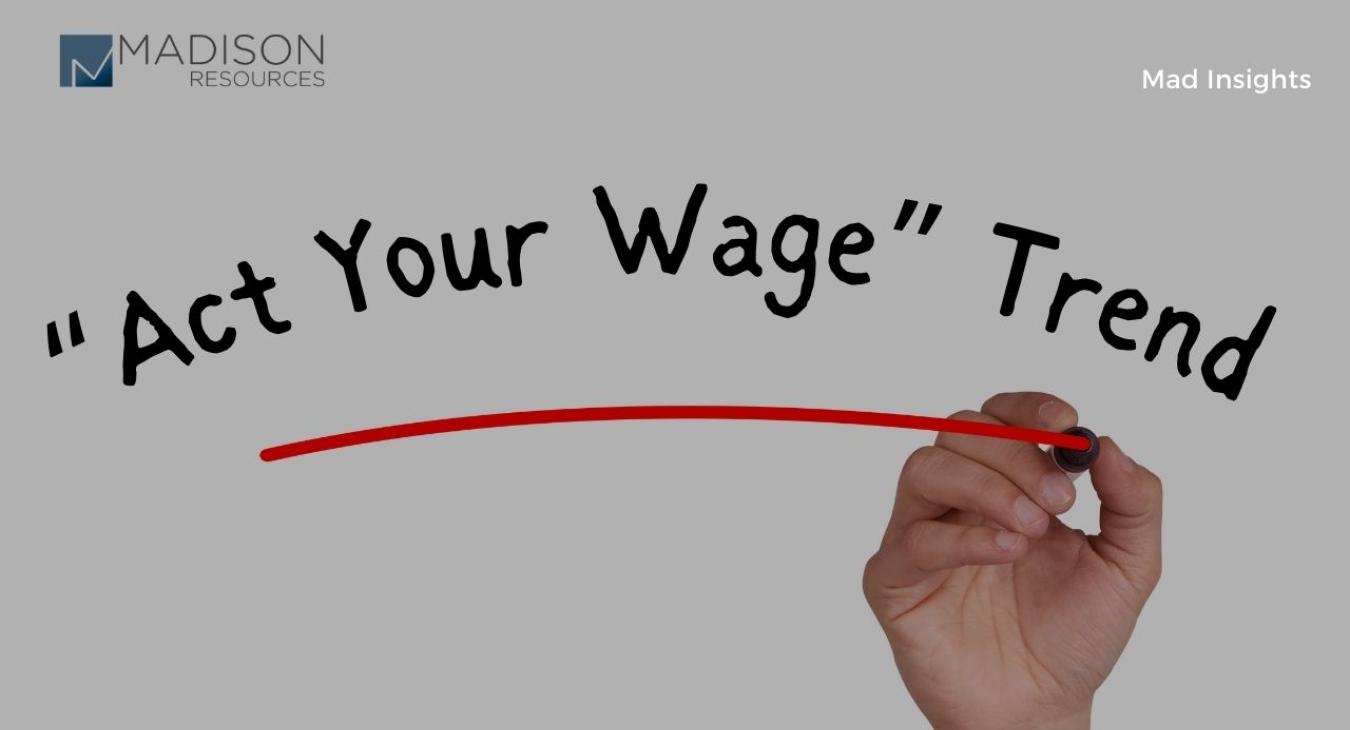Breaking Down the Act Your Wage Trend
From Quiet Quitting to 'Act Your Wage' – A Recruiter's Guide to Navigating the Paradigm Shift in Workplace Dynamics.
The push for better working conditions, better pay, and a stronger work-life balance has not yielded. A recent trend on the matter has emerged; Act your Wage. The trend is yet another stance taken by American workers to illuminate their workplace desire to their employers. The paradigm shift continues to unfold as we move from a hustle culture into a slow and steady output in the workplace.
What is the Act your Wage Trend?
This new trend as a mindset within the employee that states that the amount of effort they put into their role should directly reflect their pay. Employees are taking a stance against heavy workloads and creating a boundary between the worker and the looming threat of burnout by only putting in what they feel they are being compensated for. In a tight job market, surveyed employees are feeling 38% more burnt out than a year as they are overwhelmed with greater workload
While some employees may find this empowering, many employers are describing it as a quick way to stunt your career. Employees are feeling exhausted and overwhelmed, and employers don’t want to cater to temper tantrums.
Why is Act Your Wage taking root?
This most recent trend among employees appears to be the younger sibling of Quiet Quitting, an older trend that details the mindset and actions of employees that are feeling overwhelmed and under-compensated.
The biggest factor in the new trend is the burnout experienced by workers overwhelmed with hefty workloads. There is a massive generational shift taking place. With it comes a refocusing of living to work, to working to live, creating a more enjoyable and manageable work-life balance.
As a new generation enters the workplace, work culture shifts are nearly inevitable. Since COVID, we’ve seen a greater acceptance of flexibility in the workplace with more remote work options becoming available. We’ve seen a better conversation around mental health, and businesses have been stepping up to show not only that they can roll with the times, but that they hear the general needs of the public and of their staff.
How can you, as a recruiter, help?
76% of workers that feel valued by those in leadership positions report feeling emotionally and mentally safe in the workplace. It’s become extremely clear looking at the recent staffing industry trends that employees want to feel valued and balanced when it comes to work and managing life at home.
As a recruiter, you get to be the voice of the candidate and the client in one. Take time to get to know your client beyond the data and job description. Do they provide mental health support? What are current and past employees saying about the company? Take this information to your candidate to show that not only do you care about their needs beyond the workplace, but that your client does too. A survey 69% of employees shared that they would work harder if they felt more appreciated.
Get clear about what your candidate is looking for and what they’re passionate about. Link their passions to the job description and be creative about the way you share the role. Tailor it to the candidate, understanding that everyone can experience the same thing in a multitude of different ways.
These trends show what’s possible as the workplace culture shifts and the staffing industry is asked to pivot. At this point, it’s about more than the role, it’s about the experience and overall quality of employee life. Act your Wage may seem juvenile at face value, but the core of the phenomenon is a common need among job seekers and employees that is not being met. Businesses are invited to rework the way they operate and establish themself as a breathing entity, versus a corporate machine.
Key Takeaways
- The "Act Your Wage" trend reflects a workforce demanding a direct correlation between effort and compensation, driven by a desire to combat burnout caused by heavy workloads.
- Rooted in a generational shift towards a better work-life balance, this trend signifies a move away from the hustle culture, influenced by factors like increased flexibility and attention to mental health in the workplace.
- Recruiters play a vital role in addressing these evolving needs, emphasizing the importance of valuing employees, understanding individual passions, and fostering a more personalized approach to job placement.
Ready to revolutionize your staffing recruitment process? Check out these other employment trend articles:
-
Great Resignation: Discover innovative strategies for sourcing candidates amidst the Great Resignation. Explore more insights here.
-
Quiet Quitting: Learn how to recruit "Quiet Quitters" and navigate the challenges of this emerging trend in the job market. Dive into the details here.
-
The Big Stay: Explore the phenomenon of "The Big Stay" and its impact on employee retention strategies. Discover more here.
-
Quiet Hiring: Explore the concept of "Quiet Hiring" and discover how recruiters can leverage this trend to their advantage. Read more here.
Don't miss out on staying informed about the latest trends shaping the employment landscape! Sign up for our weekly newsletter to stay up to date with staffing industry trends. Get access here!
Read more articles
- Log in to post comments


